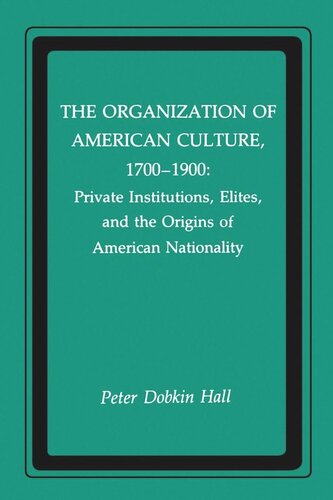

Most ebook files are in PDF format, so you can easily read them using various software such as Foxit Reader or directly on the Google Chrome browser.
Some ebook files are released by publishers in other formats such as .awz, .mobi, .epub, .fb2, etc. You may need to install specific software to read these formats on mobile/PC, such as Calibre.
Please read the tutorial at this link: https://ebookbell.com/faq
We offer FREE conversion to the popular formats you request; however, this may take some time. Therefore, right after payment, please email us, and we will try to provide the service as quickly as possible.
For some exceptional file formats or broken links (if any), please refrain from opening any disputes. Instead, email us first, and we will try to assist within a maximum of 6 hours.
EbookBell Team

5.0
80 reviewsNationality, argues Peter Hall, did not follow directly from the colonists' declatation of independence from England, nor from the political union of the states under the Constitution of 1789. It was, rather, the product of organizations which socialized individuals to a national outlook. These institutions were the private corportions which Americans used after 1790 to carry on their central activities of production.
The book is in three parts. In the first part the social and economic development of the American colonies is considered. In New England, population growth led to the breakdown of community - and the migration of people to both the cities and the frontier. New England's merchants and professional tried to maintain community leadership in the context of capitalism and democracy and developed a remarkable dependence on pricate corporations and the eleemosynary trust, devices that enabled them to exert influence disproportionate to their numbers. Part two looks at the problem of order and authority after 1790. Tracing the role of such New England-influenced corporate institutions as colleges, religious bodies, professional societeis, and businesses, Hall shows how their promoters sought to "civilize" the increasingly diverse and dispersed American people. With Jefferson's triumph in 1800. these institutions turned to new means of engineering consent, evangelical religion, moral fegorm, and education. The third part of this volume examines the fruition a=of these corporatist efforts. The author looks at the Civil War as a problem in large-scale organization, and the pre- and post-war emergence of a national administrative elite and national institutions of business and culture. Hall concludes with an evaluation of the organizational components of nationality and a consideration of the precedent that the past sets for the creation of internationality.